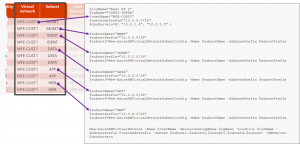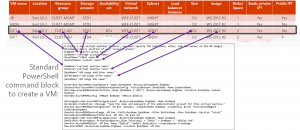Design Azure infrastructure services to host a multi-tier LOB application
Deploying typical multi-tier line of business (LOB) applications as virtual machines in Azure is a combination of what you already know and new information about the networking, storage, and compute elements of Azure infrastructure services. To help you figure it all out, determine the design of the Azure environment by addressing the following:
- Resource groups
- Connectivity
- Storage
- Identity
- Security
- Virtual machines
To understand this design methodology and use it for your own LOB application, see the Design and Build an LOB application in Azure IaaS video and slide deck of the November 2016 webinar for the Cloud Adoption Advisory Board (CAAB).
This webinar has the following sections:
- Definitions and assumptions (starts at 3:12)
- Design process (starts at 8:05)
- Design example (starts at 38:50)
- Build with Azure PowerShell (starts at 50:30)
The result of the design process, which incorporates Azure Patterns and Practices recommendations and best practices, is a table of virtual machines and their associated Azure-specific settings. Here is an example:
After you have determined the table entries, it’s much easier to build out the elements and get all of the settings correct. For example, here is how you might use the table and a PowerShell command block to create a virtual network and its subnets:
And here is how you might use the table and a PowerShell command block to create a virtual machine:
The slide deck has the following appendices that were not covered in the webinar:
- PowerShell command blocks Each slide is a fill-in-the-blanks set of Azure PowerShell commands to build an element of Azure infrastructure services.
- Design your naming conventions Tips for determining how to name your Azure infrastructure elements.
I hope that this information gives you a defined process for accelerated and successful deployments of LOB applications hosted in Azure.
To join the CAAB, become a member of the CAAB space in the Microsoft Tech Community and send a quick email to CAAB@microsoft.com to introduce yourself. Please feel free to include any information about your experience in creating cloud-based solutions with Microsoft products or areas of interest. Join now and add your voice to the cloud adoption discussion that is happening across Microsoft and the industry.



